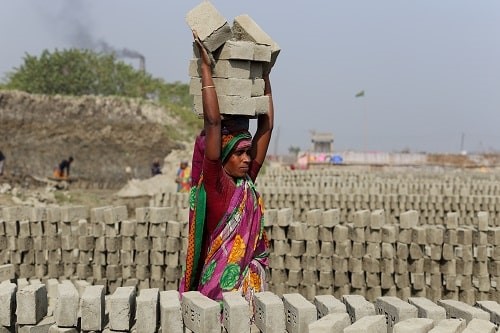Despite slavery being abolished over 180 years ago, 40.3 million people around the world are living in some form of modern slavery.
Features
The skeleton in the closet
The statement above means that there are more people working in slavery conditions today than there were during the hundreds of years of slave trafficking between the 16th and 19th centuries. In the UK specifically, the Global Slavery Index indicates that there are 136,000 victims of modern slavery.
Certain parts of the British hospitality and construction industries in particular represent the devastating proof that times have not changed enough for the better. Both industries are high-risk sectors for cases of human trafficking, forced or compulsory labour and servitude. Workers in these sectors are commonly subjected to excessive working hours, threats of violence and both unreasonable and unlawful contracts.
Solving the problem actually starts with a simple realisation – many businesses are not able to trace exactly where their workers come from. The labour supply chain has become so entwined and muddied that business owners and managers can be completely oblivious to cases of modern slavery that are happening within their workforce.
 Layers of intermediaries, agents and brokers—unbeknown to the business—may be subjecting workers to highly exploitative labour. Photograph: iStock
Layers of intermediaries, agents and brokers—unbeknown to the business—may be subjecting workers to highly exploitative labour. Photograph: iStock
While much attention has been given to ensure businesses can trace the sources of their products, the unregulated networks through which forced or trafficked workers may be recruited, transported and supplied to businesses by third-party agents
has grown.
The issue may not necessarily lie within the hospitality establishment or construction company in question, so we need to go back through the layers of intermediaries, agents and brokers who – unbeknown to the business – may be subjecting workers to highly exploitative labour. For example, people who are struggling with poverty and discrimination, such as migrant workers, are often coerced into making risky decisions in order to seize opportunities that promise them a way out.
Once they are in this position, they are easy to manipulate as many are not aware of the law or their own rights and often have no one to turn to. This manipulation can include paying to get the job in the first place, having passports taken away, being forced to work for no pay or being physically threatened or abused — the offenders’ treatment of the victims only gets more inhumane. Those trapped in modern slavery do not have the freedom to walk away. They are trapped.
To fully address the issue, a significant change at a societal level is certainly required. We need to disrupt the system that makes people vulnerable and instead create a culture where victims of slavery are not reluctant to come forward to the authorities to ask for help. While this change is likely to take time, we have to start somewhere and businesses can take immediate action.
Where to start - what businesses need to do
First of all, large businesses have a legal obligation to investigate their supply chains, which filters down through small and medium businesses too. This means the decision-makers who hire employees have the required information at their disposal. These audits unveil the layers of subcontracting which can corrupt even the most well-intentioned of organisations. Processes must be put in place to ensure employers have full visibility of who is working for them and what kind of relationship their workers have with outside agencies and recruiters.
 Hospitality and construction are high-risk sectors for cases of human trafficking, forced or compulsory labour. Photograph: iStock
Hospitality and construction are high-risk sectors for cases of human trafficking, forced or compulsory labour. Photograph: iStock
Secondly, businesses must help their employees recognise the signs of modern-day slavery. The way to truly move towards eradicating slavery in the workplace starts with educating the workforce and empowering them to take action. Informative, high-quality training raises awareness of the issues at hand, what they look like; it gives employees the confidence to speak up about any concerns or suspicions, and it informs them on who to report their worries to.
This topic needs to be put back on the agenda at all levels of a business.
It is vital that we keep talking about this inhumane practice as it still permeates our society. While the introduction of the 2015 Modern Slavery Act took the first step, it’s now in our hands to take the next step, but we need to know what we can do, and how.
Awareness courses and training helping to uncover worker abuse can be a way to raise awareness of the issue and help your business to shed light on this too-often hidden crime. It can also help you be one of the ethical leaders in eradicating modern slavery – which not only makes your organisation a company of choice, but quite simply, it’s the right thing to do.
We all have a responsibility to look after one another and bring modern slavery to an end.
Lottie Galvin is Studio manager at iHASCO
FEATURES

Why quality data is essential when using AI for occupational safety and health management
By Dr Bob Rajan-Sithamparanadarajah. Safety Groups UK (SGUK) on 01 April 2025
Artificial intelligence-powered models, systems and technology have the potential to significantly improve the management of occupational safety and health (OSH) risks, but it is vital that OSH practitioners understand the limitations and dangers of using AI to protect people at work.

Sustainable aviation fuels: how do we put the SAFety in SAF?
By Megan Hine, Draeger Safety UK on 01 April 2025
Sustainable aviation fuel is seen as having great potential to reduce the greenhouse gas emissions from air transportation. However, as with other emerging renewable energy sources, the safety risks arising from the production, processing and storage of these biofuels can be accompanied by new risks and will require careful management from the safety industry as utilisation increases to meet the Government’s mandatory targets.

Why social sustainability should be a priority for health, safety, environmental and compliance professionals
By Agnes Chruszcz, IEMA (Institute of Environmental Management and Assessment) on 01 April 2025
By embedding social sustainability principles into their policies and operations, organisations can not only improve quality of life for their employees, workers in their supply chains and the communities they interact with, but boost their business resilience, productivity and reputation.



